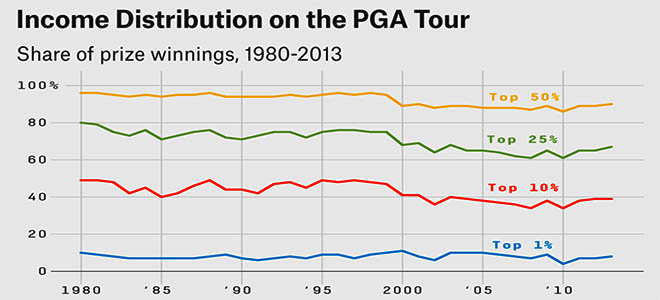
There’s Income Inequality in Golf, Too
FiveThirtyEight
by Roger Pielke, Jr.
April 13, 2014
Earlier this year, several analysts at the Harvard Sports Analysis Collective took a look at income inequality in the major U.S. sports leagues. Using Gini coefficients, an economic tool that distills the degree of inequality among a set of earners to a single number, the collective found the NHL to be the most equitable and MLB to be the least. The researchers found that salary caps help limit income inequality, essentially. The results are below. A Gini coefficient of 0.0 means that every player has the same income perfect equality and a Gini coefficient of 1.0 means that one player takes home all of the income perfect inequality.
NHL: 0.42
NBA: 0.52
MLS: 0.54
NFL: 0.57
MLB: 0.621
But those are team sports. With the Masters tournament unspooling this week, I started wondering about income inequality for the PGA Tour, a collection of athletes that doesn’t have a salary cap. Surely, after more than a decade of big purses for Tiger Woods, Phil Mickelson and a select few others, golf would prove to be an unequal sport.
It is, but increasingly less so. Since 1980, the PGA Tour has been shifting toward more income equality. How that happened, and how golf differs from other professional sports, shows that high levels of income inequality aren’t inevitable, even when individual athletes have different levels of skill.
In 1980 the PGA Tour had a Gini coefficient of 0.70, which put it well above the major U.S. team sports. But last year the coefficient dropped to 0.58 (calculated using this tool). That holds, but to a lesser extent, if we look just at the top 100 money winners in 2013 the tour’s Gini coefficient was 0.32, down from 0.36 in 1980.
The move toward equality has happened despite huge amounts of cash injected into the game. In 2013, 82 golfers each won more than $1 million. Phil Mickelson, a three-time Masters champion, told ESPN this week, I remember when I was an amateur and I won my first tournament in Tucson in 1991, the entire purse was $1 million, first place was $180,000 and Steve [Loy, my agent] and I would sit down and say, I wonder if in my lifetime, probably not in my career, we would have play for a $1 million first-place check. [Now] it’s every week. It’s unbelievable, the growth of this game. Read more …

